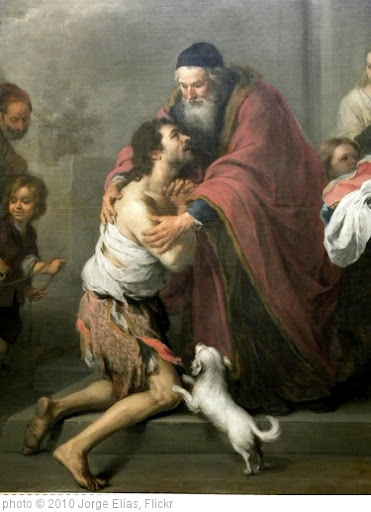I didn’t get all the answers I wanted from reading Rob Parsons’ short book called Bringing Home the Prodigals. (I don’t get all of the answers I want when I read Scripture either.) I didn’t read the book, and immediately receive a phone call from one of my “prodigals” saying that she was returning to the faith and wanted to go to church on Sunday. I prayed the prayers printed in the book, and my prodigal son hasn’t come home—yet.
 However, I was reminded of the truths that God has already spoken to my heart during this time of waiting on Him and trusting Him to do His work in my life and in the lives of my family members:
However, I was reminded of the truths that God has already spoken to my heart during this time of waiting on Him and trusting Him to do His work in my life and in the lives of my family members:
Ultimately, we are all prodigals, Elder Brothers and Younger Sons and a little of both, and Christ is our only hope.
We the people of God’s church, by our legalism and our unloving attitudes, have made open rebels of some who were never rebels in the first place. We have driven God’s children away from us because of the color of their hair, or the clothes they wear, or the beverages they drink, or the language they use, or the piercings or tattoos they have on their bodies.
The great problem with the church in the Western world is that half the prodigals are still in the pews—and don’t realize their lost condition. “Our churches are filled with nice, kind, loving people who have never known the despair of guilt or the breathless wonder of forgiveness.”
Seeds sown into the soil of our children’s lives go deep into the soil of their very being. Never give up.
 We cannot live someone else’s life for him. Children make choices. And sometimes those choices are bad ones.
We cannot live someone else’s life for him. Children make choices. And sometimes those choices are bad ones.
“Our children are ultimately God’s responsibility. He is their Father. He does not ask the impossible of us. Only that we love them.”
“You and I cannot bring up godly children; it is not our responsibility—it is too heavy a burden. We are called instead to live godly lives.”
“In love’s service, only the wounded soldiers can serve.” ~Thornton Wilder.
If we claim to be without sin, we deceive ourselves and the truth is not in us. If we confess our sins, he is faithful and just and will forgive us our sins and purify us from all unrighteousness. ~I John 1:8-9
See what great love the Father has lavished on us, that we should be called children of God! And that is what we are! The reason the world does not know us is that it did not know him. Dear friends, now we are children of God, and what we will be has not yet been made known. But we know that when Christ appears, we shall be like him, for we shall see him as he is. ~I John 3:1-2
Love that second quote, Sherry!
Yes. Thank you.
I agree with you that we have all been a prodigal to an extent.
I was a run-away at age 17, gone for 6 months. Then came home, ironically on Thanksgiving Day 1981. I can relate to the story of leaving the nest of my parents, then trying to make it in the world, then in coming back home to where I needed to be for a bit longer.
I have a brother that is still a prodigal at age 59. Unless we give him money (all of us have cut him off) then he said he does not want to hear from us. He lives in a foreign country, he is running from a warrant for his arrest. Most of us are in agreement we may never see him again.
I agree also with your point that we cannot live another’s life for them. We cannot control another person, this includes our adult children.
We love them in spite of what they are doing, we love them unconditionally. We may not like or agree with what they are doing, but we are still called to love them.
I have another brother named Bobby. Several years ago, and for the first time in a long time, he visited a church with a friend. Because Bobby had a long beard and long hair he was told not to come back, they asked him to leave the church. Bobby has not gone back to any church since then.
Many in the church are guilty of the prejudice and arrogance and prideful thinking that if you look like me, or talk like me, or live like me, then I’ll accept you and you can be my friend.
I say hog wash.
Thank you for this great, great, and most timely post!
Pingback: 12 Favorite Nonfiction Books Read in 2012 » Semicolon